Tucked away on Middleton Row, Kolkata since 1841, a sombre residential haven for Irish nuns has stood testimony to the vision of Mary Ward, founder of the Religious of the Institute of the Blessed Virgin Mary (I.B.V.M.), fondly known as the ‘Sisters of Loreto’. The congregation takes its name from the Marian shrine at Loreto in Italy.
Mary Ward lived in an era when Catholics were persecuted in England and Europe faced religious mayhem; in an era when women’s rights were unheard of; she envisioned setting up schools for young women. Her legacy took shape in India when the first of 12 Loreto Sisters came to Calcutta in 1841 and began their educational mission and opened the first Loreto School in 1842. The beacon was further carried forward some 105 years ago in 1912 with the inception of the iconic Loreto College Kolkata.
The year 2017, saw the Loreto Order celebrating its 175th year of existence in India. History has it that by the turn of the century, as Loreto House School grew larger, there was a pressing need for more space and the old Loreto House building was extended. A few years later, St. Thomas’ House, located next to the church and at the doorstep of Loreto House was purchased from the Archbishop, to run the infant school classes. Eventually, it was on February 2, 1912, that the newly established Loreto College was housed within the same premises and today both the school and the college share space and amenities across 2.75 acres.
The legacy has been further heralded by its eminent alumni—Lady Aruna Paul, kathak danseuse Prof. Amita Dutt, Uma Ahmed (Member of Human Rights commission), Dr Arundhati Ray (Former HOD, B Ed), Margaret King (Principal), Aruna Gomes (Principal), Dr Krishna Sen, Tilottama Mukherji-Tharoor, Sharmila Tagore, Moon Moon Sen and her actor daughter Raima Sen – among an almost endless list of prominent Loreto women. Ranked at all India 18th by NIRF (National Institutional Ranking Framework) 2017, Loreto College is affiliated to the University of Calcutta (CU) and adjudged an NAAC accredited 5 star college in 2000 and as a College of Potential for Excellence (CPE) since 2006.
With Principal Dr (Sr.) Christine Coutinho at the helm since 2009, her ‘passion for development of higher education’ and her exceptional love for her ‘lassies’, Loreto continues to impart new impetus to learning, empowerment, freedom and aspiration for new age women. Corporate Citizen gained valuable insights from one of the senior most professors, Dr Aditi Das Gupta, who has been associated with Loreto College since 1982 and is in her 36th year of service in the English Department and from Dr Sushma Sahai, Associate Professor (Geography)
“Loreto might have begun as an elitist institution when the sisters first came in; particularly at the college level. We still have students from privileged backgrounds but we also have students from other backgrounds. It is no longer as elite as it used to be. Loreto always had room for students who were not entirely privileged”
— Dr Aditi Das Gupta, Senior Associate Professor, Loreto College
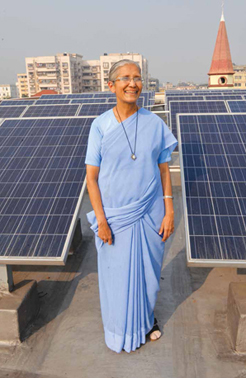 Sr. Christine Coutinho PRINCIPAL, Loreto College
Sr. Christine Coutinho PRINCIPAL, Loreto College “I work relentlessly for this college and this is my passion”, said Dr (Sr.) Christine Coutinho, Principal, Loreto College, Kolkata. She reiterates that running the college is “tough but, it is really worth it”. She believes that together with the 850-odd students and more to come, the college promises to forge valuable associations within society and beyond.
Aditi Das Gupta: The college was established by Irish missionaries and imbibed the aspects of Loreto education which is common to all its schools and colleges. The emphasis on quality education has been a part of Loreto’s conception from the very beginning. When the sisters first came to India, the idea was to offer education of a certain quality. The other aspect was on holistic development—not academics alone—as students were exposed to many different ways of learning that remains ingrained even today. Today, there is this great emphasis on interdisciplinary studies which has actually been a part of Loreto training since its inception in 1912. They did not call it ‘interdisciplinary’ then and the labels might have been absent, but students were encouraged to listen and taken out to see plays and films, even before we had the various media forms. Students were actually taken out to attend lectures at the Indian Museum along with formal music education within Loreto’s schools and college. Because it was controlled by the missionaries, there was an emphasis on building a certain social awareness in the students’ ethos. Even a student from very privileged background, didn’t get insulated and that’s an aspect of Loreto education. Students engage in social work in a systematic manner, which is an integral part of the Loreto curriculum.
 Loreto College campus
Loreto College campusAditi Das Gupta: The beginnings since 1912 saw Christian girls, specifically, catholic girls, attending the college but two or three years later, girls from some of the leading Bengali families enrolled too. The daughters of eminent Indian doctor, educationist, and philanthropist and ‘swadeshi’ entrepreneur- Sir Nilratan Sircar were among the students of Loreto in the first decade. The daughter of the Indian poet Manmohan Ghose attended Loreto too. Gradually, it no longer stayed as a college primarily for Christian students; you now had not just ‘Bengalis’ but students from very many different communities—the Thai, Chinese, Jewish— joining the institution. As late as 1951, as per some reports, the then student-president had said that there were some 14 different languages being spoken amongst Loreto students.
Sr. Christine Coutinho: We encourage girl students from other countries to come to us because with the culture of our college, we can always imbibe something new. Thai students are very gracious and with them, our girls turn gracious too. We also have girls from the Austrian Greek Orthodox community. So far, we have not increased the fee structure for foreign nationals and they are paying the same fee as anybody else.
“We have Geography which is run in parallel to Economics and Sociology and is our forte. We have a strong hold to cover most of these subjects and students can choose FROM. Earlier, they didn’t have much of a choice but now we offer more electives and options”
—Dr Sushma Sahai, Associate Professor, Loreto College
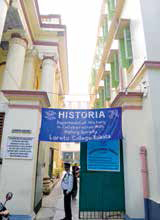
Aditi Das Gupta: Sir Nilratan Sircar’s granddaughter, Lakshmi Chaterjee, despite hailing from an affluent class, went on to do pioneering research on women labourers in the tea gardens. Her contributions lie in her consciousness which she imbibed from her learnings at Loreto. She may have come from a very exclusive background but her field of work was one in which she was certainly reaching out way beyond her social boundaries. This kind of community connect remains an integral aspect of Loreto’s learning environment.
Aditi Das Gupta: Kolkata was very cosmopolitan in those days until very recently as the first city of the British Empire. Initially non-Catholic students could come from the more privileged classes but this was not true of the Catholic students. Loreto might have begun as an elitist institution when the sisters first came in, particularly at the college level. We still have students from privileged backgrounds but we also have students from other backgrounds. It is no longer as elite as it used to be.
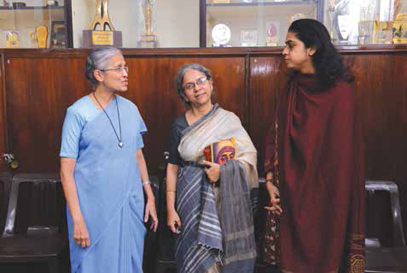 L to R - Sister Christne, Aditi Das Gupta and Sushma Sahai
L to R - Sister Christne, Aditi Das Gupta and Sushma SahaiToday, Kolkata is no longer ‘that’ sort of a cosmopolitan hub, but, we still have students from a wide section of Indian communities with different religions and language backgrounds. The shift was a gradual open-door policy. While Loreto always had room for students who were not entirely privileged but in terms of the ratio, lately there is greater access for these students as Loreto is just reflecting the countrywide changes in opening our doors to higher education.
Sushma Sahai: The shift began many years ago and admission based on income barriers is no longer prevalent. It’s a public misconception. Today we have first-generation learners. We therefore have introduced certain general course studies like Geography. Some of our first-generation learners have had no formal schooling and some come from the Indira Gandhi Open University (IGNOU). Loreto’s doors are open to all and we believe in inclusive education for all.
Aditi Das Gupta: We initially called it a Liberal Arts college with emphasis on English and History. The B Ed department played a very active part and till date does so. Consecutively, and for over a decade, we have had first-class rank holders. Since 2009, we had Economics as an elective but have now converted that to a major. Subjects like Mathematics have been introduced along with Sociology. We now have an Honours degree in Economics too. We have been offering a UGC-funded certificate course in Human Rights since 2006. Certain subjects which are currently in demand such as Film Studies, Journalism and Mass Communication have been added post 2000 to attune with the changing times.
Sushma Sahai: We have Geography which is run in parallel to Economics and Sociology and is our forte. We have a strong hold to cover most of these subjects and students can choose from. Earlier, they didn’t have much of a choice but now we offer more electives and options to choose their major and minor subjects from within their syllabi combinations.
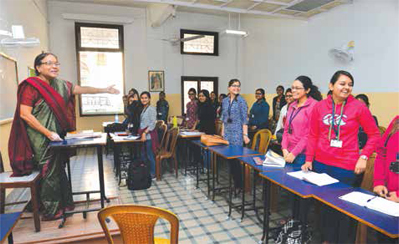 A class in progress at Loreto College
A class in progress at Loreto CollegeSushma Sahai: It is governed by the market demand. Going by the criteria on employability, we have introduced a placement cell. There are certain subjects like Economics and Psychology which gain higher employability. With counselling an integral part of many schools, there is immense scope for child and corporate counselors. Sociology and Psychology as subjects are the need of the hour and so we part of our current syllabus under the aegis of the University of Calcutta, offered by Loreto College.
Sr. Christine Coutinho: Our growth has been in all areas including infrastructure, amenities, academics, the quality of education and the academic results too have improved.
Sr. Christine Coutinho: NIRF has not made any difference to us in getting any form of grants. But, the Government of West Bengal is very happy with us as we have got this NIRF ranking along with St. Xavier’s College.
Sushma Sahai: The change in the policy of the NAAC in June opened it to all institutions and we got ours in 2012. We were the first college in Eastern India who went in for this accreditation. We also have an ‘A’ grade and were exempted as a high-performing institute; our next and 4th accreditation cycle is in 2020.
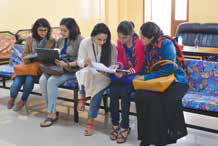
Sr. Christine Coutinho: Yes, we introduced the open book test and a new concept of 30 hours’ library. If students don’t perform well or they have lower attendance or if their academic performance is poor because of ill health, we provide extra hours under the guidance of our teachers who also monitor them. If students need any extra help, it is made available. But, students have to take a small test at the end of the 30 hours to help us quantify on their academic performance.
Sr. Christine Coutinho: Yes, but they are terrified by the thought of this 30-hour window to prove themselves. If they have low attendance within the condonable limits, they do opt for this and I have really seen improvement in them. This extra 30 hours is mandatory if they fall short of the 75% stipulated attendance stricture. Though this is kind of a penalty, it helps to keep things in check. We have also seen that some students voluntarily opt for this extra 30 hours. In a new incentive, if a student uses the library as an ongoing practice and makes good use, she is given a special certificate. These certifications add on to master courses. We also give certification for full attendance as high as 97%, as an incentive for coming to college and studying.
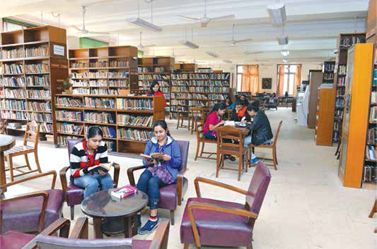 Library at Loreto College
Library at Loreto CollegeSr. Christine Coutinho: Parameters would basically be the results and pass percentages. We are affiliated to the University of Calcutta (CU) and our passing percentage is therefore graded as per CU norms. I don’t think any college has had 100% pass percentage at the B A/B Sc (Honours) level but we have had. Number of our first class rankers has also multiplied. Normally, you didn’t get many first classes in B A. (Arts) but this has also increased. We have had university toppers, especially in Economics and Psychology.
Sushma Sahai: When we talk about growth, there are quantitative parameters which most people look for but at Loreto, we also look for the qualitative. From the infrastructure point of view, we added a new floor for our new PG wing; we have a women’s cell which is part of our community outreach programme and a Research Cell. We also liaise with corporate houses for seminars that also come for placements. All these have happened in the last 3-4 years. We don’t have to ask Cognizant. In fact, they come to us and pester us to give them Loreto students!
Sr. Christine Coutinho: An aspect for quantifying our growth has been through our own publications. Every seminar that we do, we bring out a publication. The convener of the seminar is normally the editor of the publication. We have been doing this for the past five years and we already have about 10-15 publications. The process of compiling of the various seminar papers is tedious and time-consuming. For the teachers who present the papers, this is something that they can take to build up on their credentials for future career advancement.
Sushma Sahai: We also have a journal published by the department of English called ‘Critical Inference’ and the best part is that this journal has become part of the UGC list. This builds up on our impact factor and is an honour for us. Besides, we document everything that is done in the college. Each and every contributor gets a copy and is invited for their respective book launch. Mini research papers are presented by the faculty. The idea is also to give visibility to the college when handed over in the public domain.
Two of our History research paper-books were released in 2013 by Lord Swaraj Paul. Students design these books, the book cover etc. and we give them a merit certificate for their acumen. The entire organisation is involved with the theme, budget, the invitee list and the entire backup required for the official book/research paper launch.
Aditi Das Gupta: We receive government grants in the form of salaries, and grants given under different plans. Some are sanctioned grants and there are other specialised funds which we receive under the CPE (College of Potential for Excellence) and under RUSA (Rashtriya Uchchatar Shiksha Abhiyan). We always lack the money to do as much as we want to. We have also been turning to private sponsors and funding, not on very large scale but to some extent many of our seminars are funded by other bodies. The bulk is still government funding.
Sushma Sahai: The fact that we were one of the first colleges that went in for NAAC accreditation in Eastern India, speaks volumes about our academic excellence but also on our affinity for holistic learning. Besides, we are also considered under CPE (Collge of Potential Excellence) which is granted by the UGC. Accreditation involves academics, environmental consciousness, the infrastructure being offered and other amenities in place. Since 2006, the college has received grants from the UGC for both recurring and non-recurring expenditures that have gone a long way in improving our public perception that we are a CPE college.
Sr. Christine Coutinho: We offer B A / B Sc (Hons.) and B A / B Sc general degree courses. For our Hons. Course, we ask for higher percentage especially for our Psychology department as the demand is way higher for this stream. We are the best college so far for Psychology because we have good teachers. For our general category students, the minimum requirement is 50% in grade XII or equivalent. In fact, around 65-75% of Psychology incumbents from University of Calcutta are from Loreto College.
“students need to reflect; especially girls need to take informed decisions. Very often they make mistakes and some of the mistakes are irreversible. Through value education classes, I teach them dignity and that they are precious and that their education is their dowry and men cannot bully them”
— Sr. Christine Coutinho, Principal, Loreto College
Sr. Christine Coutinho: The teacher student ratio is around 1:16 overall for the college. We don’t have big departments; we have one unit for each of the departments in Science, Psychology and Geography. Economics comes under our Science stream which would have around 30 students.
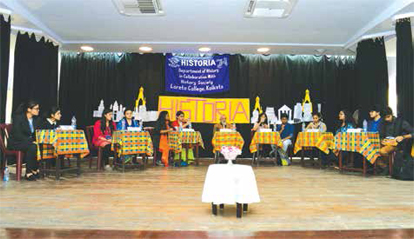 Intercollege debate in progress at Loreto College
Intercollege debate in progress at Loreto CollegeSr. Christine Coutinho: These are women who are in their late 20s or early 30s. All of them are first-generation learners and primarily come from the minority Muslim community. They are all in different stages of learning and so study in batches of 5 to 15 in a class. They follow the National Institute of Open Schooling system (NIOS) in Std 10th, because they come to us at a stage where they might have finished Std 6th or 7th. Our task is to bring them to comply with Std 8th. It is with the help of our retired teachers that they complete Std 10th and finish off Std 12th. They are incapable of paying their fees during their examination. Their books, fees and the entire programme are funded by the college. We have fixed deposits made for the women’s cell; should there be any money generated through our open-day charity programmes; the entire proceeds go to fund the Women’s Cell. The college pays the students fees from its coffers. We don’t have much by way of fixed deposits but we would rather do it for these women, who we see growing in their respective lives. Running this cell is voluntarily done by the teachers. It takes these women 4 to 5 years to finish Std 10th but teachers are patient with them. Some move on to pursue Bachelors in Education (B Ed) or TTC at the primary level, while others graduate and work in offices. It is such a joy for us, especially when they perform for Teacher’s Day. The confidence of these women can be attributed to the efforts of the women’s cell teachers who have trained them to conduct a show or presentation by themselves.
Sr. Christine Coutinho: Our students compulsorily have to render 12 hours of social service before they graduate. The third and final year students have to write the impact of the service that they have done within the community. They are free to go to any NGO or homes for the aged, children in distress, and women in distress. Many go to Shishu Bhavan or Rainbow homes. Many such orgnisations also approach Loreto for help and service.
Sr. Christine Coutinho: The college plans on putting up a rain water harvesting system. We have started with a vermin composting pit which is ready and plan is to make it a waste free campus.
Sr. Christine Coutinho: They need to reflect; especially girls need to take informed decisions. Very often they make mistakes and some of the mistakes are irreversible. Through value education classes, I teach them dignity and that they are precious and that their education is their dowry and men cannot bully them. Intuition is never old-fashioned and it will prevent them from many dangers in life; so rely upon your intuition. You have to multitask and juggle commitments.
By Sangeeta Ghosh Dastidar